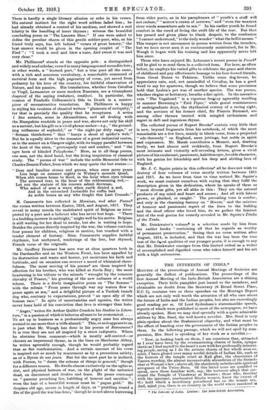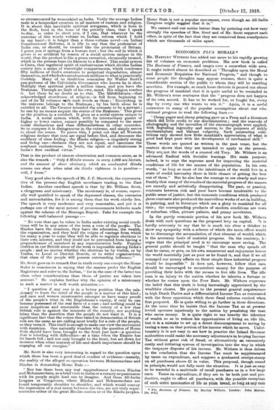THE INTERESTS OF INDIA.*
MINUTES of the proceedings of Annual Meetings of Societies are generally the dullest of publications. The proceedings of the first Annual Meeting of the Indo-British Association are a shining exception. Their little pamphlet just issued to the members, and obtainable no doubt from the Secretary (6 Broad Street Place, B.C. 2), contains two or three speeches on the Montagu Report which are not only well worth the attention of all who care about the future of India and the Indian peoples, but also are exceedingly good reading per se. Of Lord Sydenham's statesmanlike speech, reports of which were published in most of the newspapers, we have already spoken. Here we may deal specially with a quite admirable address by Mrs. Steel, the well-known novelist. Mrs. Steel is very plain-spoken about the Brahminical oligarchy, and what must be the effect of handing over the government of the Indian peoples to them. In the following passage, which we will not spoil by com- pression, Mrs. Steel is speaking of her work as a novelist :— "Now, in looking back on them, I am conscious that, attracted as I ever have been by the overmastering charm of India, sympa- thetic as I find myself to the heart's core with her profoundly interest- ing people, seeing as I do the artistic charm of her whole min-en- scene, I have glozed over many sordid details of Indian life, such as the horrors of the temple court at Kali ghat, the obscenities of Tantra worship, the almost inconceivable absurdities of the Striach- char or Woman's law ; above all, the absolutely unbelievable spiritual arrogance of the Twice-Born. Of this latter none are qualified to speak, save those familiar with, say, the tortuous alleys that sur- round the Temple of Viseshwar at Benares ; those who, familiar with the ignorant, uneducated Hindu women, know the extent of the hold which a hereditary priesthood has on the female sex. And, mind you, there is no country in the world where mankind is • The Intermit of India. London : The Indo-British Association.
so circumvented by womankind as India. Verily the average Indian male is a henpecked creature in all matters of custom and religion. It is about this inevitable spiritual arrogance, which is born in the flesh, bred in the bone of the priestly class, that I speak to-day, in order to show you, if I can, that whatever be the outcome of this wordy volume on Indian reform which I hold in my hand—it is longer than a three-volume novel—on Indian Constitutional Reforms, it is idle to say that the proletariat of India can, or should, be treated like the proletariat of Britain. I grant you it springs from a human root ; but the soil in which it grows is so artificial by reason of a social system unique in the world, that the product is like a green carnation, chemically treated, which in the process loses its likeness to a flower. This social system is Caste, that regulated spirit of exclusiveness which divides Indian society into a series of watertight compartments, which condemns fifty millions of God's creatures to perpetual degradation, almost damnation, and which elevates fourteen millions to what is practically Godship. Many of us doubtless remember Sir Walter Scott's pen-pictures of the. Calvinistic Covenanter who knows he is elect. Multiply that spiritual pride a million times, and you have the Brahman. Through no fault of his own, mind. His religion teaches it. Let there be no doubt as to this. The Mfilifihhilrata—that acknowledged storehouse of religion—is full from beginning to and of its 32 volumes with such words as these : 'Everything in the universe belongs to the Brahman • by his birth alone he is entitled to all. The Creator intended the outcaste to be a servant ; he can by no means acquire the status of the Brahman.' This gives us the position in a nutshell. It gives us a social system unique to India. A social system which, with its intermediary gamut of higher or lower castes, cannot possibly be compared to the mere social distinctions and class differentiations in other countries. So to compare it is disingenuous in the extreme, and simply serves to cloud the issues. To prove this, I point out that all Western religions declare that men are equal before God, and denounce the snobbery of class feeling ; the Hindu religion—a singularly strong and living one—declares they are not equal, and canonises the resultant exclusiveness. In truth, the spirit of exclusiveness is India's first cardinal virtue."
That is the product of sincere observation and common-sense, as is also the remark : "Only 8 Hindu women in every /,000 arc /iterate, and the amount of sheer obstinacy which an uneducated Hindu woman can show when what she thinks righteous is in question— well, I know."
Very good also is the speech of Mr. J. C. Shorrock, the representa- tive of the present-day English merchants trading to the East Indies. Another excellent speech is that by Mr. William Scott, a clergyman and missionary. The missionary is, of course, especi- ally well qualified to speak of the depressed classes, the outcastes and untouchables, for it is among them that his work chiefly lies. The speech is very moderate and very reasonable, and yet it is perhaps one of the most potent of pronouncements hitherto made against the scheme of the Montagu Report.. Take for example the following well-balanced passage :—
"No vote that olin be taken in India under existing social condi- tions will be in any sense of the term a vote of the people. The Hindus have the numbers, they have the education, the wealth, the organisation, and they hold the coigns of vantage from which for many a year to come they will be able to regulate elections to their own interest, and they could not be prevented from having a preponderance of members in any representative body. Popular eleetion in our British sense of the term is impossible among India's people : and no matter whether the elections be by Guilds, or by Trades, to Local or District Boards, or to wider organisations, that class of the people will possess outstanding influence."
Mr. Scott goes on to remark that in truth every one except the Home Ruler is unanimous in saying that the masses prefer the English Magistrate and ruler to the Indian," for in the case of the latter too often other considerations than those of justice are taken into account." Ho explains further why the opinion of a missionary in such a matter is well worth attention :— "I question if any one is in a better position than the mis- sionary to learn the mind of the people in a matter of this kind ; and men and women missionaries amongst us have many proofs of the people's trust in the Englishman's equity, if only he can become possessed of the real facts of a case ; and nothing could be more iniquitous and censurable than the outcry of a few that British rule is against the interests of the country, nor anything falser than the assertion that the people do not want it. It is a significant feat that the voices thus raised in denunciation of British rule are the same as are calling most loudly for a rule of the people, as they term it. This itself is enough to make one view the movement with suspicion. One naturally wonders why the question of Home Rule should have been brought to the front just now—a question that is bristling with difficulties—at a time when the Empire has its hands full ; and not only brought to the front, but set down for decision when other matters of life-and-death importance should be engaging all our energies."
Mr. Scott is also very interesting in regard to the question upon which there has been a good deal of conflict of evidence—namely, the reality of the alleged co-operation between Mohammedans and Hindus in demanding Home Rule :— "Nor has there been any real rapprochement between Hindus and Mohammedans, as a brief visit to India or a cursory acquaintance with its people might lead one to imagine. And these All-India Leagues or Congresses, where Hindus and Mohammedans are fourid temporarily shoulder to shoulder, and which would convey the impression of a real union between the two, are not truly repre- sentative either of the great Muslim nation or of the Hindu peoples.
Home Rule is not a. popular movement, even though an All-India Congress might suggest that it is."
We cannot end our notioe better than by pointing out how very strongly the speeches of Mrs. Steel and of Mr. Scott support each other, in spite of the fact that they are conceived from standpoints which are thousands of miles apart.



































 Previous page
Previous page